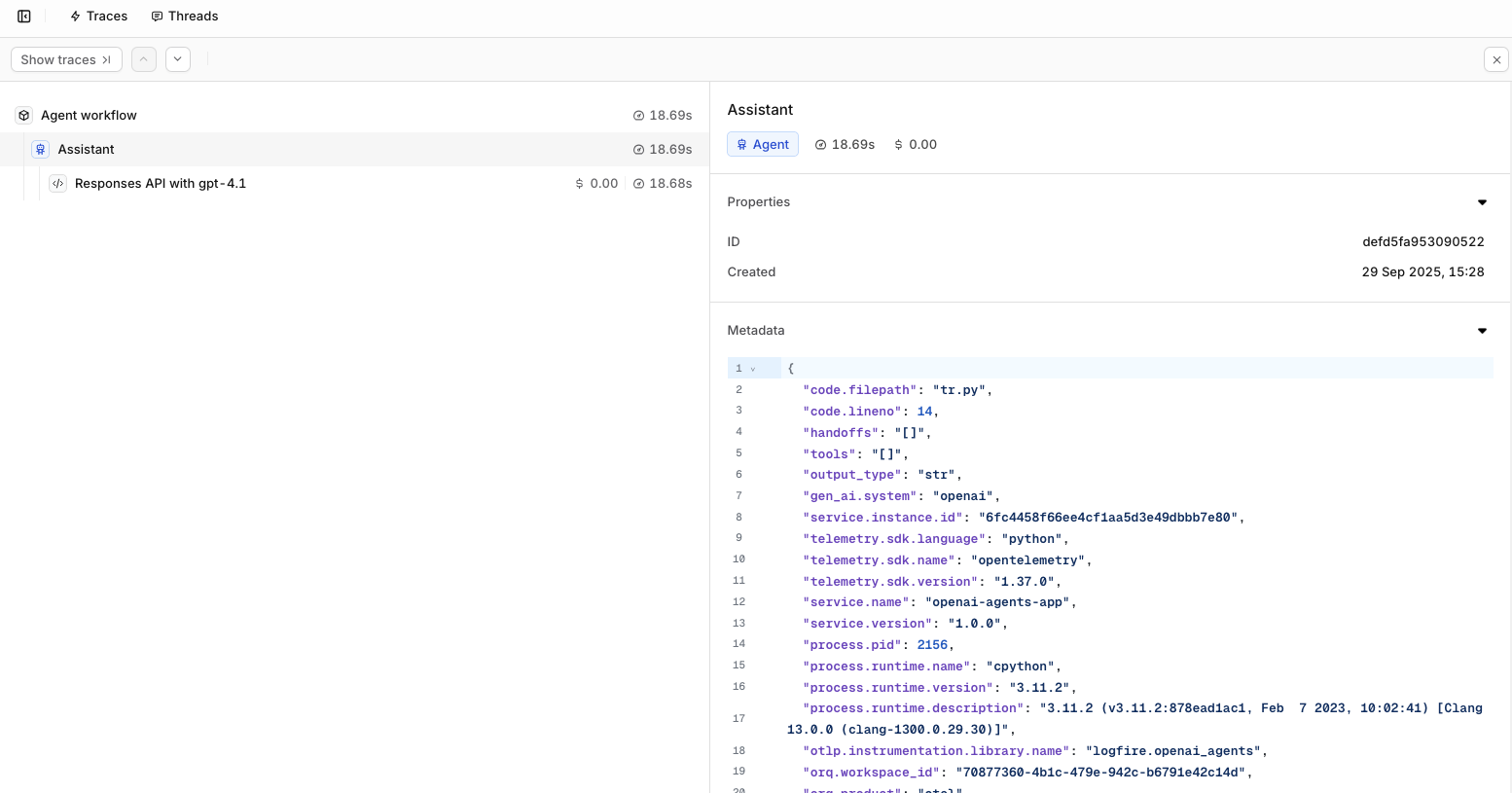OpenAI Agents
Integrate Orq.ai with OpenAI Agents using OpenTelemetry
Getting Started
OpenAI Agents and the Assistants API enable powerful AI-driven automation through structured conversations and tool calling. Tracing these interactions with Orq.ai provides in-depth insights into agent performance, token usage, tool utilization, and conversation flows to optimize your AI applications.
Prerequisites
Before you begin, ensure you have:
- An Orq.ai account and API Key.
- OpenAI API key and access to the Assistants API.
- Python 3.8+.
Install Dependencies
# Core OpenTelemetry packages
pip install opentelemetry-sdk opentelemetry-exporter-otlp
# OpenAI SDK
pip install openai
# For simple auto-instrumentation:
pip install logfire
Configure Orq.ai
Set up your environment variables to connect to Orq.ai's OpenTelemetry collector:
Unix/Linux/macOS:
export OTEL_EXPORTER_OTLP_ENDPOINT="https://api.orq.ai/v2/otel"
export OTEL_EXPORTER_OTLP_HEADERS="Authorization=Bearer $ORQ_API_KEY"
export OTEL_RESOURCE_ATTRIBUTES="service.name=openai-agents-app,service.version=1.0.0"
export OTEL_EXPORTER_OTLP_TRACES_PROTOCOL="http/json"
export OPENAI_API_KEY="<YOUR_OPENAI_API_KEY>"Windows (PowerShell):
$env:OTEL_EXPORTER_OTLP_ENDPOINT = "https://api.orq.ai/v2/otel"
$env:OTEL_EXPORTER_OTLP_HEADERS = "Authorization=Bearer <ORQ_API_KEY>"
$env:OTEL_RESOURCE_ATTRIBUTES = "service.name=openai-agents-app,service.version=1.0.0"
$env:OTEL_EXPORTER_OTLP_TRACES_PROTOCOL="http/json"
$env:OPENAI_API_KEY = "<YOUR_OPENAI_API_KEY>"Using .env file:
OTEL_EXPORTER_OTLP_ENDPOINT=https://api.orq.ai/v2/otel
OTEL_EXPORTER_OTLP_HEADERS=Authorization=Bearer <ORQ_API_KEY>
OTEL_RESOURCE_ATTRIBUTES=service.name=openai-agents-app,service.version=1.0.0
OTEL_EXPORTER_OTLP_TRACES_PROTOCOL=http/json
OPENAI_API_KEY=<YOUR_OPENAI_API_KEY>Integrations
Logfire Basic Example
import logfire
logfire.configure(
service_name='orq-traces',
send_to_logfire=False, # Disable sending to Logfire cloud
)
# Enable automatic instrumentation for OpenAI Agents SDK and standard OpenAI client
logfire.instrument_openai_agents()
from agents import Agent, Runner
agent = Agent(name="Assistant", instructions="You are a helpful assistant")
result = Runner.run_sync(agent, "Write a haiku about recursion in programming.")
print(result.final_output)Advanced Example with Function Calling
from agents import Agent, Runner, function_tool
import logfire
logfire.configure(
service_name='orq-traces',
send_to_logfire=False, # Disable sending to Logfire cloud
)
# Enable automatic instrumentation for OpenAI Agents SDK and standard OpenAI client
logfire.instrument_openai_agents()
@function_tool
def get_weather(location: str) -> str:
"""Mock weather function"""
return f"The weather in {location} is sunny, 72°F"
def advanced_assistant_with_tools():
# Create agent with tools using Agents SDK
agent = Agent(
name="Weather Assistant",
instructions="You are a weather assistant. Use the get_weather function to provide weather information.",
# Tools parameter with the decorated function
tools=[get_weather]
)
# Run the agent with user input
result = Runner.run_sync(
agent,
"What's the weather like in Boston?"
)
return result
# Run the example
result = advanced_assistant_with_tools()
print(result.final_output)Custom Spans for Agent Operations
import logfire
logfire.configure(
service_name='orq-traces',
send_to_logfire=False, # Disable sending to Logfire cloud
)
# Enable automatic instrumentation for OpenAI Agents SDK and standard OpenAI client
logfire.instrument_openai_agents()
from agents import Agent, Runner
def agent_workflow_with_custom_spans():
with tracer.start_as_current_span("agent-workflow") as span:
span.set_attribute("workflow.type", "research_assistant")
with tracer.start_as_current_span("agent-creation") as create_span:
# Create agent using Agents SDK
agent = Agent(
name="Research Assistant",
instructions="You are a research assistant specialized in data analysis.",
# Note: Built-in tools work differently in Agents SDK
# You'd need to import and use specific tools like CodeInterpreterTool, FileSearchTool
)
create_span.set_attribute("agent.name", "Research Assistant")
create_span.set_attribute("agent.model", "gpt-4") # Default model
with tracer.start_as_current_span("agent-execution") as exec_span:
# Execute the agent with input
result = Runner.run_sync(
agent,
"Analyze the trends in the uploaded dataset"
)
exec_span.set_attribute("message.content_length", len("Analyze the trends in the uploaded dataset"))
exec_span.set_attribute("execution.status", "completed")
span.set_attribute("workflow.success", True)
return {
"agent_name": "Research Assistant",
"final_output": result.final_output,
"execution_status": "completed"
}
# Run the workflow
result = agent_workflow_with_custom_spans()
print("Final output:", result["final_output"])Next Steps
Verify Traces in the Studio.

Traces will also display the custom spans created through
You can also call OpenAI's models and APIs using the AI Gateway.
Updated 19 days ago
What’s Next